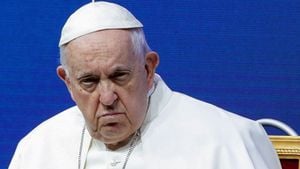Germany is gearing up for early federal elections on February 23, 2025, following the unexpected dissolution of the Bundestag, which had been initially scheduled for September. The political climate is charged with uncertainty as voters will decide the future direction of the nation amid rising concerns over far-right influence and economic instability.
The catalyst for these early elections was the collapse of the ruling coalition, which consisted of the Social Democrats (SPD), the Greens, and the Free Democratic Party (FDP). The coalition fell apart after deep-seated disagreements on financial matters, leading to Chancellor Olaf Scholz calling for the dissolution of the Bundestag after failing to secure parliamentary support. Since 1949, such occurrences have been rare, highlighting the unusual political turbulence Germany is experiencing.
Under the new electoral system, voters will cast two ballots: one for a candidate within their constituency and another for their party of choice. This method is intended to provide fair representation; parties must achieve at least 5% of the national vote to enter the parliament, or they must win three constituencies out-right.
Recent polling indicates the conservative Christian Democratic Union and its Bavarian sister party, the Christian Social Union (CDU/CSU), are leading with approximately 30% of voter intentions. This is followed closely by the far-right Alternative for Germany (AfD), which has gained significant support, polling at around 20%. Meanwhile, the SPD, once the leading party, has seen its fortunes plunge to about 15%, signaling serious voter dissatisfaction with the current administration.
Issues of immigration and security have taken center stage as pivotal themes influencing the electorate. Recent violent incidents involving migrants have ignited fears and concerns, prompting voters to reconsider their positions as they grapple with the ramifications of immigration policies. The increasing narrative pushed by the AfD—which has successfully positioned itself as the main opposition voice against immigration—reflects growing anxieties within the population.
Friedrich Merz, the leader of the CDU, has been positioning himself as he wrestles with balancing traditional conservative policies and the influence from the far-right. Following the CDU's recent motions on immigration, which found unexpected support from the AfD, many critics warn about the slippery slope of normalization, which could lead to detrimental shifts within mainstream German political discourse. "The CDU... has presided over new measures with support from AfD, which raises alarms about potential future coalitions," stated Paul Maurice, Secretary General of the French Institute for International Relations (IFRI).
Chancellor Scholz, meanwhile, remains steadfast, attempting to rally support amid widespread criticism of his administration's handling of pressing issues such as rising inflation and energy crises exacerbated by the war in Ukraine. Scholz aims to present himself as the stabilizing alternative, though his popularity has waned significantly, impacting his ability to sway undecided voters.
Observers are particularly wary of the AfD's electoral fortunes due to its controversial stance on numerous issues and its historical associations with far-right ideologies. "The AfD is accused of flirting with neo-Nazi elements and could bring about existential threats to democracy if its representation grows," highlighted political analyst Sylvie Matelly. The radical-right party has found resonance among various societal segments disillusioned by traditional parties, and concerns over economic decline have only solidified its appeal.
On the campaign trail, both AfD supporters and opponents have gathered at events across the country, highlighting the stark divisions present within German society. Activists opposed to the AfD stress the urgency of mobilizing against their platform, intent on preventing Germany from veering toward extremist policies.
Alongside the looming specter of the AfD's influence, the economic backdrop cannot be ignored. Germany's economy has faced considerable challenges, particularly the fallout from the energy crisis initiated by geopolitical tensions. The impact of inflation and supply chain disruptions has left many voters expressing frustration, pushing them to seek answers from new political movements advocating change.
Looking toward the elections, analysts speculate on potential coalitions. Should the CDU succeed and avoid affiliation with the AfD, it will likely require partnerships with other center-left parties like the SPD or Greens to maintain governance. This scenario presents both challenges and opportunities, as these interactions could change the political and economic fabric of Germany.
While the election serves to address the internal dynamics of German society, it is also being monitored internationally—particularly by Ukraine. With Germany being one of the largest aid contributors to Ukraine, the outcome will directly impact Europe's geopolitical stance as western allies confront Russian aggression. A victory for Merz could tilt Germany toward more assertive support for Ukraine, something the SPD's Scholz has been cautious about.
The upcoming elections stand as not just a bid for control of parliament but also as Germany's response to present dilemmas of identity, democracy, and economic stability. Voter turnout and engagement will be closely watched as they navigate this volatile political terrain; the results could reshape Germany's role both domestically and on the global stage.
All eyes will be on the votes cast come February 23, as the ramifications of these decisions could reverberate for years to come, influencing not only the future of Germany but the entire European continent.



